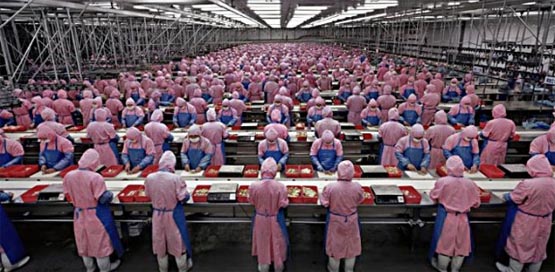By Prabhakar Overland
(February 2012) – Apple boss Tim Cook said this month that his company, the world’s biggest by market value (nearly $100bn) in cash and investments, had grown by nearly two-thirds in a year and that this is “more than we need to run a company”.
His statement came at a time when Apple has reacted to growing criticism over alleged abuses of workers at its suppliers by asking an independent group, the Fair Labor Association (FLA), to conduct audits of several of its contractors’ factories in China.
In 2010 there was a spate of suicides, prompting Foxconn, a main Apple supplier in China which employs some one million people, to install nets around the edges of some buildings to prevent people jumping off the roof, The Guardian reported.
Subsequently a public letter that claims to be from two former workers at a plant that makes iPhone touchscreens surfaced, begging Apple to improve working conditions in factories. The workers claim to have been poisoned by toxins in a factory in Suzhou, China, while assembling touchscreens for Apple’s iPhone. The letter specifies that the workers have suffered neurological damage as a result of using a chemical cleaner called N-hexane, The Telegraph reports.

Apple is not the only modern technological giant which has failed miserably to treat its workers well. In January 2012 it transpired that workers at the Microsoft-contracted KYE factory in Dongguan City, Guangdon toil away 12 hours a day and earn 43 cents an hour. “We are like prisoners,” one KYE worker told according to the Digital Journal. “It seems like we live only to work. We do not work to live. We do not live a life, only work.”
In September last year it became known that Amazon, the online book store, hires hourly-paid workers to wrap up the merchandise it sells and these workers are forced to work in dreadful conditions in Pennsylvania, USA.
It was reported that Amazon had arranged to have paramedics parked in ambulances outside their colossal warehouse ready to treat any workers who were dehydrated or suffering from other forms of heat stress.
TIME Magazine reported that employees were escorted off the premises on a regular basis if they could not keep up their productivity at a certain level in the 45C heat. “Such sights encouraged some workers to conceal pain and push through injury lest they get fired as well,” the local Morning Call newspaper reported.
Capitalism’s unwillingness to safeguard basic worker welfare is not exactly breaking news. More than 150 years ago, Karl Marx watched in horror as corpses of children were brought out and cremated in cauldrons outside factories walls. In 1867, in Das Kapital, Marx wrote:
In some branches of the wool industry in England the employment of children has during recent years been considerably diminished, and in some cases has been entirely abolished. Why? Because the Factory Acts made two sets of children necessary, one working six hours, the other four, or each working five hours. But the parents refused to sell the ‘half-timers’ cheaper than the ‘full-timers’. Hence the substitution of machinery for the ‘half-timers’.
Still, many will find it hard to believe that the darlings of Wall Street and the tech-savvy among us violate basic human rights and workers’ rights in this manner. Indeed, it is not hard to see a line linking the scenes of the days of Marx to the present.
Neither Marxism nor capitalism have been able to guarantee workers’ security. Marx’ equality principle cared first and foremost about the State and destroyed all socio-economic and human dynamics. Today’s China may perhaps be called a case of revised state capitalism, straddled as it is between market capitalism and political communism, as reported by Mark McDonald on the New York Times. The capitalist system is always under mounting pressure to increase its profits. It cannot and will never care about workers primarily.
The solution lies in evolving a consumption-motivated economy with a predominant cooperative sector. The fundamental spirit of that system should be that every citizen has a fundamental value — an existential value — that supercedes the output value of individual participants.
PROUT founder P.R. Sarkar wrote:
Capitalism will never support decentralization, because capitalist production exists to maximize profits. Centralization means industry for profit, while decentralization means industry for consumption. PROUT’s approach, which will be supported by all rational people, is production for consumption. PROUT’s maxim is, “Production for consumption, not production for profiteering.
The output value — the social value — should come into play and count only when the basic necessities are secured for everybody. The surplus wealth should be distributed among meritorious people according to the degree of their merit after the basic necessities are distributed to all on the basis of work, according to the second fundamental principle of PROUT.
PROUT cooperatives within a decentralized, balanced economic framework present the way forward for those who want to safeguard the welfare and prosperity of workers.
Sources
Das Kapital Vol 1, K. Marx, 1867.
Decentralized Economy 2, P.R. Sarkar
Copyright The author 2012
